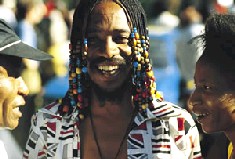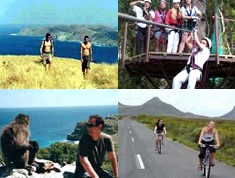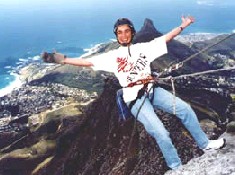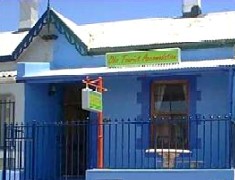Chris Marais
First off, go out and buy a couple of kikois. Whether you're a boy or a girl, macho or not, this sarong-like piece of clothing will be your life-saver when the sun's blasting down, when the travel gear is rolling around in the washer, when you've got some downtime and you don't need to dress up.
The kikoi, which comes from Kenya, has been adopted by African overlanders and backpackers as the preferred chill-outfit from Cape Town to Cairo.
Next, go out and buy the travel books on South Africa. If you're a surfer, you don't want to find out about the perfect point-break B&B; at the end of your trip. If you're a birder, you'd like to know where to find the elusive blue swallow long before you hit these shores. And if you like to drink a lager at sunset with the best bathing in the southern hemisphere at your feet, it's nice to know about Lookout Beach in advance, right?
You'll want publications like the Insight Guide to South Africa or The Rough Guide to South Africa (see box down right) to get you started. But once you're delving through the Africa shelf at your favourite bookstore, you might want to flip through the massive array of coffee table publications on the country. And having seen what the light can do, you may want to double your camera film order. Then check out the South African Tourism website.
Once you're in South Africa, all the major centres have well-run provincial tourist offices. Nose around in there, and you'll find the particular set of pamphlets you need to tailor-make your trip.
Transport
If you've got a fantasy about riding around SA on the end of your thumb, lose it. This is not hitch-hiker country. South Africa is the kind of place where, if you know what to do and where to go, you'll never experience a finer trip. But it's not advisable to enter into the unknown anywhere in the world these days, and South Africa is no
exception.
So when you're in the cities, like Johannesburg, Cape Town or Durban, use the public transport system, get a cab or hire a car. Best of all, if you're staying for a spell, you could do worse than buy a car - and sell it at journey's end. Each city has a vibrant tourism centre which will advise you on day tours, bus routes to and from your hostel, and discounts where available.
The bus services between cities are excellent, and so are the roads. And the backpackers' delight, the Baz Bus, is the last word in hostel-to-hostel drop-offs. It's South Africa's only convenient hop-on hop-off door-to-door backpacker bus service to over 80 hostels in more than 50 cities and towns.
If it's in your budget, then the classic road trip through South Africa (hire or buy a car, share the cost with travelling friends) will offer up more delights than anything Route 66 ever dreamt of.
Your foreign licence (as long as it's printed in English) is valid for six months. If yours is in another language, then get an International Driving Permit before you depart for SA.
Where to stayThe good news is there are more than 150 backpackers' accommodations in South Africa, and you can book ahead by contacting Backpacker Tourism South Africa. The other good news is that backpackers' bed rates are astoundingly cheap in this country.
Even more good news is that once you're staying at a backpacker's, you can plug in to the local travelling network and find out all kinds of great things, like where to eat for next to nothing or party until dawn or find a long-lost friend. You're in a well-run overlanding subculture here, so enjoy it.
Your choice of where to stay depends on what you want out of the trip. South Africa is, to pound a cliche, a great smorgasbord of tourism opportunities for you to feast on.
The bad news? Well, the good news is there is no bad news here!
The people
Within hours of your arrival, you're going to discover that South Africa is a great, heaving melting pot of cultures, colours, languages and traditions. And in the New South Africa, we're very proud of our diversity.
Your pocketbook guides will tell you about them, and how to behave around them. But, like most places, if you're friendly and polite with the people you meet, chances are you'll be met with at least twice the warmth.
So prepare to spend time with a Zulu warrior around the fire at night, wake up at dawn and go on a game drive with a ranger who speaks Afrikaans, be served some exotic local dish by a beautiful Malay girl, share a bus with a bunch of transplanted Scots and learn to say things like "Howzit?" (How is it/ are you?), "Hey, my bra, that's lekka" (Hey, my brother, that's wonderful), and "Sharp!" (cool).
TownshipsWe're barely eight years out of apartheid, and the teeming townships of South Africa are, like the favellas of Brazil, poverty-ridden places where sensitivities are high.
But there's nothing to beat a township shebeen pumping after midnight, full of laughter and jazz, or a township marketplace on a Saturday morning. There's a sense of vibrancy in SA's townships that cannot be met in the traditionally quieter urban suburbs. This is where you meet the soul of South Africa.
You can't say you've been here unless you've really been here, in one of the townships. But take a guide, go with an accredited tour, don't just blunder off into a strange settlement. And with the right introductions, and a few simple safeguards, you'll have a right old time of it.
- Soweto, heartbeat of the nation
- Accommodate is a website dedicated to the independent traveller seeking to experience the diverse cultures and histories of South Africa's townships first-hand.
Culture's fine, you say. But where's the rush? Welcome to Adrenalin Central.
South Africa is where you can toss yourself over the highest bungee jump in the world, where you can hit the white waters of our river systems in rubber ducks (inflatable boats), where you climb the peaks of our mighty Drakensberg mountains, where you can microlight through the hills of Mpumalanga, and where you can dive - thankfully in a cage - in the middle of Great White Shark territory.
There's a different level of outdoor activities which includes horseback trail-riding, cattle mustering, hiking for days through mind-blowing landscapes, quietly fishing for the noble trout in our Highlands, or tracking the rare black rhino for hours in the safe hands of a trained guide.
South Africa was built for the outdoors spirit, and we celebrate this in a hundred different ways.
PhotographyDust is the enemy - always remember that if you're carrying cameras in South Africa. One of the reasons our sunsets are so spectacular is because of mid-air dust, which also tends to foul up camera equipment if care is not taken.
In the winter, you'll find your soft light from about 3pm to 5pm, and in the summer it all starts and ends a little later. But, if you can make it, the African dawns are equally superb for photography. Try to time your photo-excursions for the "bookends of the day", leaving the harsh light of the lunch-hour for the poolside siesta.
If you're packing more than a little pocket camera, then consider dropping in a 300mm zoom lens for the long shots, especially when you're out in the wilderness and you can't get closer to those lions. For normal street-work and portraits, a smaller 28-80mm zoom lens is best.
Food and drink
Prepare yourself for World Grub, a global gastronomic trip that could begin with chicken sosaties (kebabs) and end with mopani worms fried over an open fire. We have Chinese, we have Italian, we have American, we have good old British stodge - but we also have Cape Malay, KwaZulu-Natal Indian, boerekos (farm fare), and the finest lamb chops from the vast Karoo scrublands.
The South African service industry is on a fast track, and you'll have no problems eating out or self-catering.
When it comes to the beer and the wine, you'll find both plentiful, excellent and very cheap. South African beer, because of the hot weather, is a special favourite. And a tour of the winelands will have you sending cases of Cabernet home.
The nightlifeOur cities all have their clublands, catering to the various youth tribes in the country. Raves, folk clubs and jazz clubs are everywhere. Listen out for kwaito, our home-grown township R&B; rap style - you might be taking some Mandoza CDs home.
Cafe society has finally caught on in SA. For decades, no one did anything but walk on the sidewalks, and now you literally can't move for all the coffee bars and late night restaurants that have sprung up. Again, Durban, Jo'burg and Cape Town are night-life favourites, but prepare for after-hours surprises in places like East London, Port Elizabeth and Bloemfontein.
The mediaThe big cities have all got their set of daily newspapers, and there's a lively magazine industry that supports tourism. Travel tips, lifestyle information and facts you can use can be found in all our bookshops and news agents. If you want to catch up on national news from home, most leading newsgents also carry offshore publications.
Internet cafes have blossomed all over South Africa, and you'll find them not only in the large centres but also in many of the small rural towns you'll be passing through. Take time off to keep in touch with the family. Encourage them to come over and join you!
SafetyThe same rules apply as for anywhere else in the world. Be careful. Don't wander off alone down dark alleys at night. Try not to display all your electronic possessions. Pack cash, credit cards and traveller's cheques in separate places. Let your lodge or hotel know where you are. Leave your expensive jewellery at home. Keep a look out for muggers, and store your wallet where it can't be pickpocketed. Take care around automatic cash machines.
These and many other safety rules are what you should be following back home and while travelling anywhere abroad. Crime is not endemic to South Africa.
Last-minute reminders- Health/travel insurance?
- Malaria pills for the summer months (November through March, for certain parts of the country)?
- Relevant contact numbers?
- Luggage locks?
- Sunglasses and hats?
- An unbridled sense of fun and adventure?
Chris Marais, travel editor for African Explorer, is a multi-award-winning photographer and writer who spends his time criss-crossing sub-Equatorial Africa in search of new travel routes, cultural features and the kind of story the armchair adventurer loves to read about. He works with his wife, Julienne du Toit, one of the world's top environmental journalists. Together, they run Main Line Media, an extensive photo and features library specialising in travel, human interest and green issues.
This article was first published on South African Tourism











